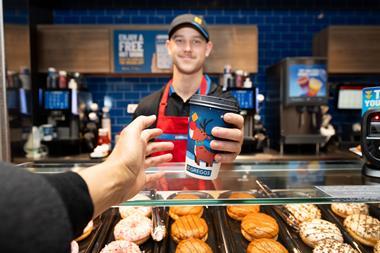High-sugar treats including biscuits and cakes should be banned from lunchtime meal deals, according to health campaigners Action on Sugar (AOS).
The group made the call following research that found some lunchtime meal deals contained up to 30 teaspoons of sugar.
AOS is urging supermarkets and retailers to exclude all high-sugar drinks and confectionery – those that would have a red traffic light label – from the deals.
Baked items highlighted as part of ‘shocking’ combinations included: Boots’ Delicious Carrot Cake, with 28g of sugar per 71g pack, Morrisons’ Millionaire Shortbread, with 26.5g of sugar, and The Co-op’s Rocky Road Bar at 23g of sugar.
These were paired with the likes of Morrisons’ Sweet Chilli Chicken Wrap with Relentless Passion Punch Energy 500ml drink; and Co-op Meal Pot Blackbean Pulled Beef & Noodle with Rockstar Blueberry Pomegranate Acai energy 500ml drink; in combos with 28 teaspoons of sugar per deal.
“Eating too much sugar is linked to obesity, type 2 diabetes, cancer and tooth decay,” said Graham MacGregor, chairman of Action on Sugar and Professor of Cardiovascular Medicine at Queen Mary University of London. “The government now needs to take decisive action to ban all promotions of unhealthy foods.”
The British Nutrition Foundation (BNF), which recently worked with Jamie Oliver on a report about nutrition in schools, told British Baker consumers needed to be aware of the options available and make healthy decisions.
“We’re eating more sugars and saturated fat than we should and it’s important that consumers are aware of the different options available in meal deal offers, which often include fruit or vegetables as the ‘snack’ and sugar-free drinks or water,” a BNF spokesperson said. “It’s best to choose healthier options most of the time, including those lower in free sugars and saturated fat, higher in fibre, and with plenty of fruit and vegetables.”
Last month, hospital chiefs were told that three-quarters of pre-packed sandwiches and other savoury pre-packed meals sold in their hospital canteens, stores and vending machines must contain 400 calories or less per serving and must not have more than five grams of saturated fat per 100g. Failure to meet the targets will mean hospitals lose out on funding ring-fenced for improving the health of staff, patients and their visitors.
































No comments yet